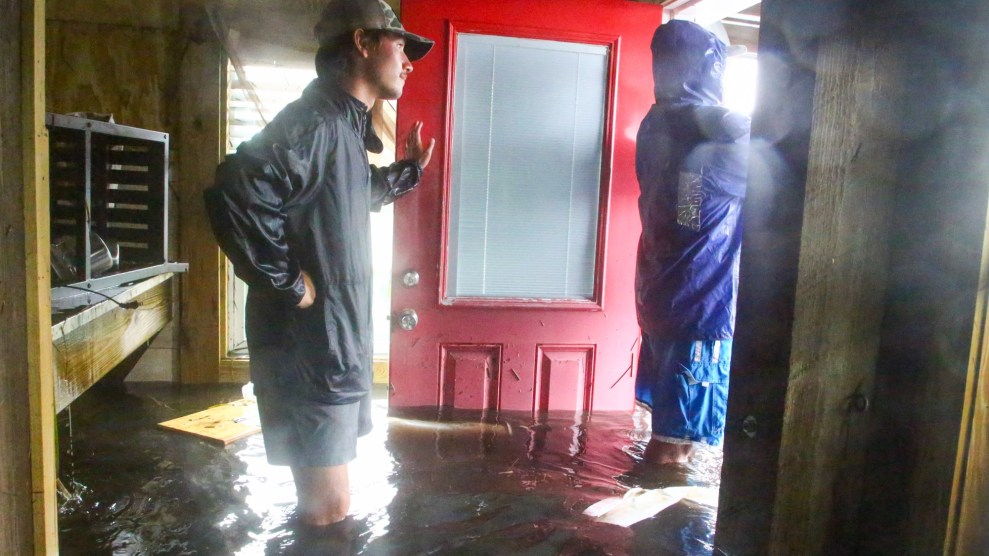
Zach Bunkley, a 22-year-old charter captain, left, and maintenance worker Oscar Garcia, 52, inspect Hurricane Idalia damage to a rental cottage at the Sea Hag Marina on Wednesday, Aug 30, 2023, at the Steinhatchee River.Douglas R. Clifford/Tampa Bay Press/Zuma
Hurricane Idalia struck Florida 190 miles north of Tampa on Wednesday as a Category 3 storm, a classification that causes “devastating” damage, according to the National Oceanic and Atmospheric Administration. With 125-mile-per-hour winds upon landfall, it fell just short of the Category 4 metric.
This region of Florida hasn’t seen such strong wind gusts and storm surges in more than 125 years. Many roads are flooded, with water levels up to at least 8 feet.
“We have multiple trees down, debris in the roads, do not come,” posted the fire and rescue department of Cedar Key, an island connected to the mainland by bridges. There, water levels are at least 6.5 feet high. “We have propane tanks blowing up all over the island.”
“Our entire downtown is submerged,” one local resident, Michael Bobbitt, wrote on Facebook. “Houses everywhere are submerged.”
Elsewhere in the sunshine state, fallen trees have hit gas lines, and hundreds of thousands of people are without electricity as of Wednesday afternoon.
The immediate death toll and damage from the storm, though, might not be the only nightmare Floridians face. The next one could relate to how insurance companies respond to damage claims.
As I wrote earlier this month, recent changes to Florida’s tort laws orchestrated by GOP lawmakers and Republican Gov. Ron DeSantis will make it much harder for home insurance policyholders to sue their insurers for failing to adequately pay out claims for home damage. Idalia is the first hurricane to hit Florida since the laws were re-written in December 2022, following Hurricane Ian:
The sweeping revisions makes it more difficult for homeowners to sue their property insurance companies for acting in “bad faith” and removes the right of homeowners to recover attorney’s fees, even in lawsuits they ultimately win. Additionally, the adjustments to Florida’s insurance laws allow insurance companies to create new policies with mandatory binding arbitration agreements in exchange for a premium reduction, which will also thwart many homeowners’ option to take insurers to court…Moreover, the legislation shortened the window in which policy holders can file claims with their insurers, invested $1 billion of taxpayer funds into a state-run reinsurance fund to help insurance companies mitigate their losses in the event of catastrophic events, and narrowed eligibility for Citizens, Florida’s state-run nonprofit insurance company that provides insurance to people who cannot find affordable coverage on the regular market.
Home insurance premiums in the state are already four times the national average and still rising. But while Florida policyholders are paying more in exchange for fewer options in the event an insurance company acts in bad faith, the new law is a big win for DeSantis, whose political coffers have been boosted by the insurance industry:
Insurance industry employees donated at least $3.9 million to his gubernatorial race and to the “Friends of Ron DeSantis” political committee between January 2018 and December 2022. Additionally, a Heritage Insurance subsidiary and People’s Trust Insurance together donated a total of $125,000 to DeSantis’s 2023 inaugural celebration, according to a May 2023 report by the American Federation of Teachers union and three other advocacy groups.
On Monday night, DeSantis told Floridians that he wants insurers “to make people whole who pay for this service. And I think that they deserve to have their claims honored.”
Should their claims not be honored, though, it will be very difficult to take carriers to court under the new laws the governor championed.
“It’s now economically absurdly risky for a consumer to file a lawsuit,” Amy Bach, the executive director of the advocacy group United Policyholders, told me, “and it’s going to be incredibly hard to find a good lawyer.”
















